How Many People in Norway Speak English?
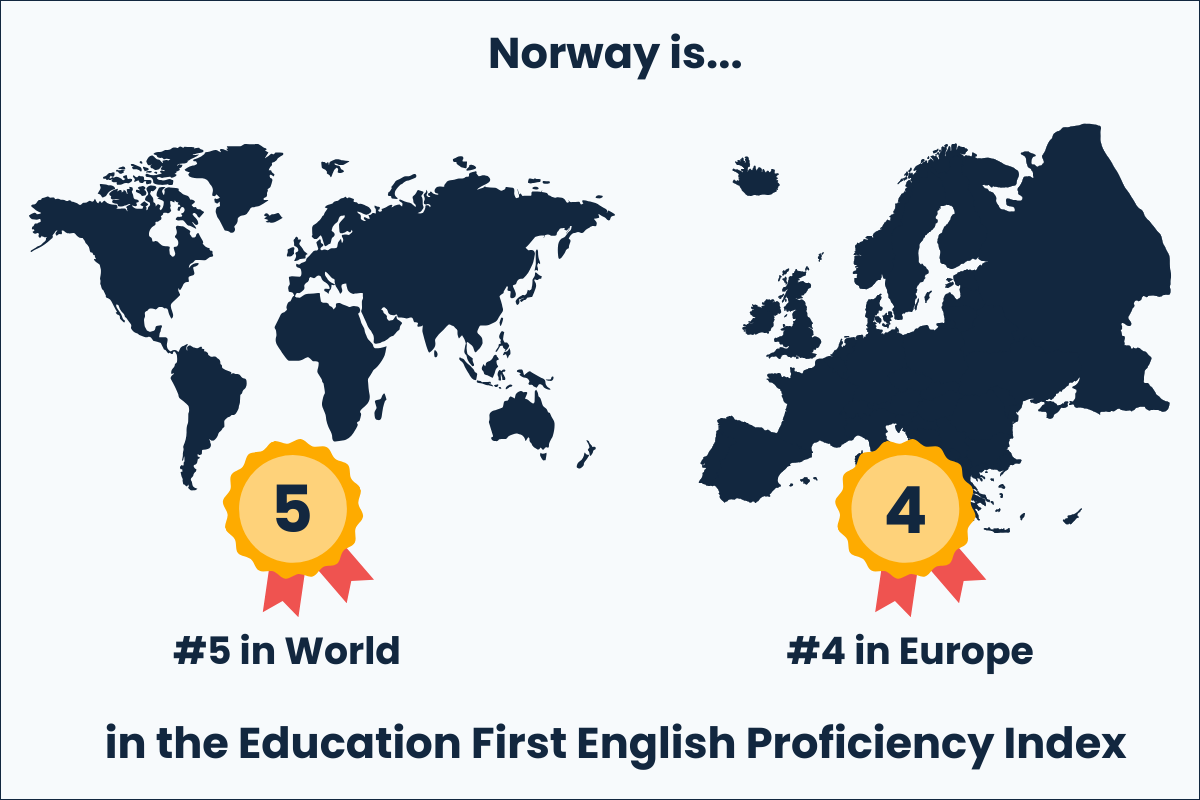
Norway is a small Scandinavian country with a great reputation. Year after year, Norway consistently stands out as one of the richest, happiest, and most egalitarian countries in the world. Unsurprisingly, Norwegians are also known as some of the best English language speakers, a fact often attributed to Norway’s high standard of education.
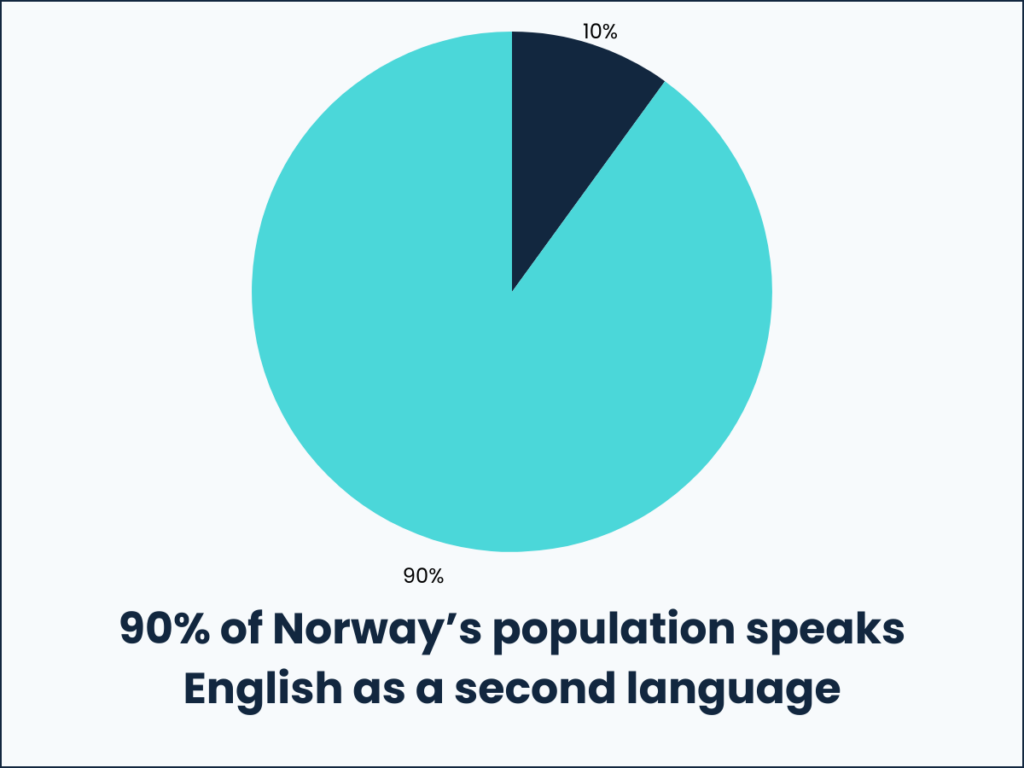
According to 2022 estimates, up to 90% of Norway’s population speaks English at least at a basic level. Moreover, according to English proficiency test scores, Norway ranks #5 globally for its high English fluency.
While we don’t know the exact number of English speakers in Norway, most estimates are impressive. Data from 2013 put the total number of English speakers at around 4.5 million, 88% of the population at the time.
If we go by the 90% estimate in 2022, while accounting for the population increase from 2013 to 2022, the total number of English speakers in Norway today is likely around 4.9 million. It’s safe to assume that the average person in Norway speaks English at least at a basic level, though many likely speak English fluently.
Curious to find out more about English in Norway? Keep reading to learn about Norway’s linguistic culture and demographics!
Number of English Speakers in Norway (General Stats)
Norwegians are often said to be among the best English speakers in the world. This is likely more than just a stereotype. Here are the stats to prove it:
- According to 2022 estimates, roughly 90% of the population (4.9 million people) in Norway speaks English.
- Norway is #5 in the world for its total percentage of the population speaking English as a second language.
- In Europe, Norway is 2nd only to the Netherlands for its relative population of English-speaking people.
- By total numbers, due to Norway’s small population, the country ranks #39 in the world and #17 among European countries.
- The 2023 English Proficiency Index (EPI) ranks Norway as #5 in the world for English skills.
- The same EPI data makes Norway #4 in Europe for English proficiency, just 1 point behind its neighbor Denmark.
- Norway’s average EPI score in 2023 was 614, the equivalent of a C1 (advanced) level in the CEFR ranking system.
- Nord-Norge is Norway’s region with the highest English proficiency scores.
- Oslo is the city with the best English speakers on average, having an EPI score of 629.
- On average, people in the 21-25 years age group have the best English skills.
- English is a mandatory subject in the Norwegian curriculum starting in the first grade of elementary school, roughly at age 6.
- English is the second most common language spoken in Norway besides the local language.
According to these numbers, roughly 9 in 10 Norwegian people speak English, a rate similar to other Scandinavian countries.
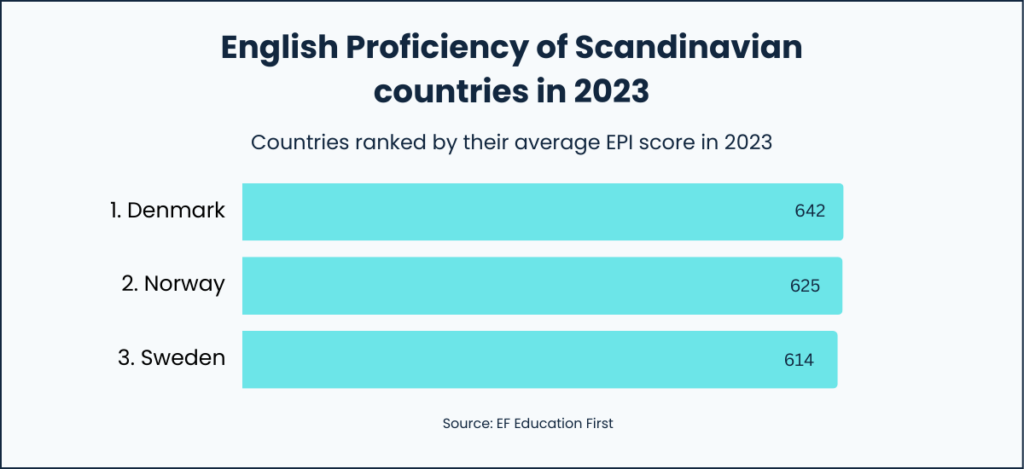
Norway has an average proficiency level of C1 on the CEFR scale, a language level which implies:
- Understanding English spoken at regular native speed and following extended speech on abstract or complex topics
- Speaking fluently and spontaneously, being able to quickly and accurately choose the right words or expressions on the spot
- Writing and reading at an academic level, understanding long and complex texts, and recognizing implicit meaning and fine nuances
- Using the language flexibly and effortlessly in a wide range of social, academic, and professional situations
This widespread level of very high English fluency in the Norwegian population is impressive. However, we must still remember that these are averages and, according to the EF website, the English Proficiency Index is not perfectly representative of a country’s proficiency in foreign languages.
Even in Norway, people might occasionally encounter a language barrier. Nevertheless, we can be quite confident in assuming most Norwegians speak English very well. All the data points in the same direction, and Norway has consistently ranked in the top 10 most proficient countries since the introduction of the EPI in 2011.
Sources: Oxford Dictionaries, Wikipedia, Macrotrends, Education First, British Council, Council of Europe
Why Do People in Norway Speak English so Well?
Norwegians are very good at speaking English, more so than many other European countries. English is the most widely spoken language in the country besides Norwegian. All numbers tell a similar story. There are a few linguistic, cultural, economic, and political factors that contribute to this:
Norwegians start learning English at a very early age
English has been a mandatory school subject in Norway for decades now. Originally, the English language became mandatory in the 60’s starting with secondary education, roughly at the age of 13.
Since 1998, with the implementation of The Education Act, English was introduced as a mandatory subject in primary schools, starting at the age of 6.
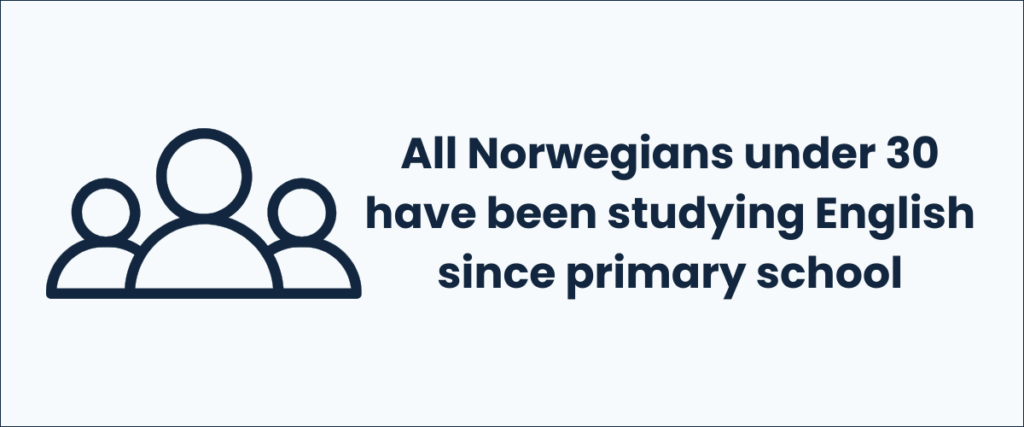
All Norwegian generations born after WWII have received mandatory English education, and those currently aged 30 and under started learning English very early on. As per the Norwegian school curriculum, education is compulsory from years 1 through 10. During this time, Norwegian students receive a total of 588 hours of English language instruction.
According to the Cambridge English website, it takes roughly 500-600 cumulative hours of study to reach a B2 level in English. So, by the end of grade 10, English students in Norway are expected to use the language at an upper-intermediate level.
The vast majority of students in Norway continue learning English throughout upper secondary education, amassing over 700 cumulative hours of English instruction. This is the approximate number of study hours to reach a C1 (advanced) level in English, according to the same Cambridge website.
Norwegian and English are very similar
Learning a foreign language similar to your native language gives you an easier start, compared to learning everything new from scratch. Such is the case for English learners who already speak other Scandinavian languages like Norwegian.
Norwegian and English share a similar origin and history. For starters, both are Germanic languages, so they’re bound to have many similarities in terms of vocabulary and, to a lesser extent, grammar and pronunciation.
The two languages are also related from a historical perspective. Old Norse, a precursor to Modern Norwegian, has left a massive impact on Old English during the three-century Viking Age in England. Unsurprisingly, the close relationship between Old English and Old Norse contributed to the similar evolution of the two languages.
Furthermore, the role of English as the lingua franca of the world after WW2 has further contributed to this mutual linguistic influence.
The result is that the two languages share a lot of common words, which makes vocabulary acquisition and recall a lot easier for Norwegians learning English. Here are a few examples:
| Norwegian | English |
| Bror | Brother |
| Søster | Sister |
| Hus | House |
| Bok | Book |
| Klokke | Clock |
| Hand | Hand |
| Tre | Tree |
| Eple | Apple |
| Drikke | Drink |
| Rød | Red |
| Hatt | Hat |
| Musikk | Music |
| Vinter | Winter |
| Sommer | Summer |
There are just a few of the most common words used in everyday Norwegian, before even counting the many English loanwords like Internett, Radio, Jobb, Taxi, Hotell, Kaffee, Restaurant, TV, Shopping, and so on.
English is common in daily life in Norway
It’s no surprise that reading and listening to materials in English every day would help learners with their vocabulary, listening, and even grammar skills. After all, practice makes perfect. And making language practice fun and engaging is one of the best ways to learn.
It just so happens that English-language media is big in Norway, with the vast majority of Norwegians consuming at least one type of content in English, be it TV shows, music, or video games. Virtually all movies and TV series are subtitled, instead of dubbed. This means that people get to hear spoken English whenever they watch a foreign show.
According to NRK, the largest broadcasting company in the country, some of the most popular English TV series in 2023 include Happy Valley, Malpractice, The Bay, and Conversations with Friends. In the younger generations, exposure to English comes mainly through music, video games, and social media.
Popular artists like Sia, Dua Lipa, Taylor Swift, David Kushner, and Tom Odell are just some of the many English-language singers topping the Spotify charts in 2023. Last but not least, video games like Fortnite, FIFA, and Call of Duty are especially popular among teenage boys in Norway.
English is a must on the job market
According to Statista, Norway’s GDP in 2021-2022 came mainly from two sectors— industry (48%) and services (42%). Most of the country’s economy relies on raw material exports, tech, manufacturing, and tourism.
Norway also keeps an international outlook, with business collaboration being a top priority. The UK remains one of Norway’s most important trading partners. Given this economic context, and considering that English is the lingua franca of business, many employers in Norway are looking for a bilingual workforce.
Naturally, English fluency is a great asset to have for Norwegians seeking better career prospects. Being fluent in English is a must for many high-paying jobs, especially in tech and finance. The service industry is also heavily reliant on English, especially in Norway’s largest tourist areas like Oslo, Ålesund, and Bergen.
Many of Norway’s universities have adapted to this demand, offering many courses taught exclusively in English. This phenomenon has even reached such a scale that The Language Council of Norway has expressed its concern on the matter, questioning the benefits of this practice.
Sources: The Local, Utdanningsdirektoratet, Cambridge English, Statista 1 & 2, Times Higher Education
English Speakers in Norway by Region
Most people in Norway speak English at least to some extent. Since roughly 90% of the population knows English, we can assume that most regions have similarly-sized populations of speakers percentage-wise.
However, like in most countries, rural areas in Norway might have a larger share of the population that doesn’t speak English or speaks English at a lower level. In 2022, only 16% of Norway’s population lived in rural areas, with the most rural parts of the country being situated in Nord-Norge and parts of Trøndelag.
What about English skills? Turns out, there’s no considerable difference in the average level of proficiency either. According to the 2023 EPI data, all surveyed regions in Norway had scores above 600 points. Here’s the breakdown of the data:
| Geographical Region | English Proficiency Score | Proficiency Level |
| Nord-Norge | 618 | Very high |
| Vestlandet | 614 | Very high |
| Trøndelag | 612 | Very high |
| Østlandet | 611 | Very high |
Unfortunately, the EF website doesn’t offer any data for Sørlandet, although this part of Norway attracts a considerable number of tourists every year, especially in Kristiansand.
As expected, most of Norway’s geographical regions fare equally well in terms of English proficiency. Although Nord-Norge has the highest score on average, the difference between the top and bottom scores is just 7 points.
Nord-Norge and Vestlandet have scores equal to or above the national average, while Trøndelag and Østlandet fall below the average countrywide score of 614. All scores above 600 points fall within the range of very high proficiency.
Sources: The World Bank, Education First
English Speakers in Norway by City
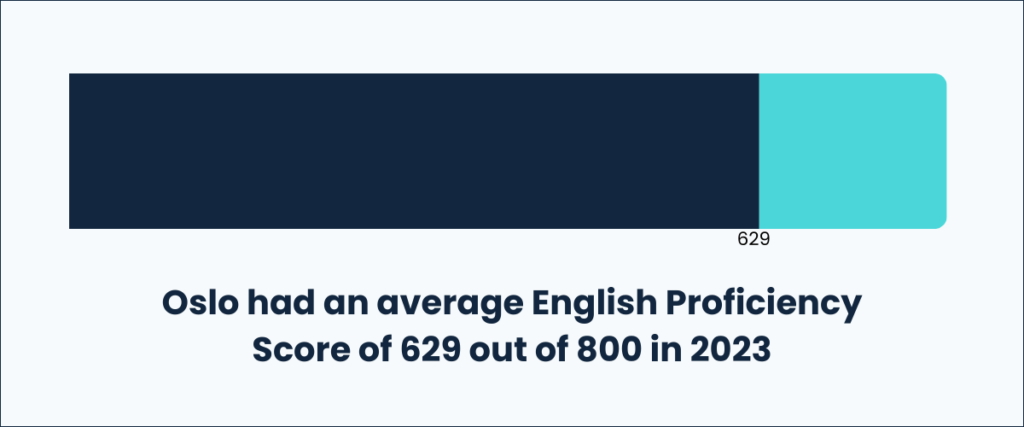
Like in most parts of the world, the cities with the most (and the best) English speakers are likely to be those with the largest and youngest populations. Metropolitan areas with big universities, tourist attractions, and a large job market are the most likely to attract this demographic.
Keeping this in mind, the top English-speaking cities in Norway are likely to be:
- Oslo
- Bergen
- Trondheim
- Stavanger
This is not an exhaustive list, as many other cities in Norway have well-developed travel industries. Places like Tromsø, Ålesund, and Kristiansand are also huge attractions for tourists from all over the world. Unsurprisingly, English is widely used in the local hospitality industry.
In terms of overall English proficiency, the EF website only offers data on two cities:
- Oslo, the capital of Norway, had an English proficiency score of 629 in 2023.
- Hamar, the 17th largest city in Norway, had a score of 619.
We don’t know the average score for any other cities in 2023. However, the large urban areas likely have very good English skills, close to or above the national average.
Oslo, in particular, stands out as the city with the largest number of speakers and the best language skills overall. Oslo, the capital of the country, is home to the University of Oslo, the second-largest higher education institution in Norway. Besides higher education, Oslo is also known for its finance, tech, medical, and trade industries, as well as its historical landmarks, beautiful nature, and vibrant cultural scene.
The same can be said about cities like Bergen, Stavanger, and Trondheim, which are the biggest in the country besides the capital. Each city has its unique attractions and local flair, but they all offer study, work, and travel opportunities for locals and foreigners alike. Trondheim in particular is most known thanks to being home to The Norwegian University of Science and Technology, the largest university in the country.
Sources: Wikipedia, Education First
English Speakers in Norway by Demographic Group
Most Norwegians speak English, so there aren’t going to be stark differences between demographic groups, except for the elderly population.
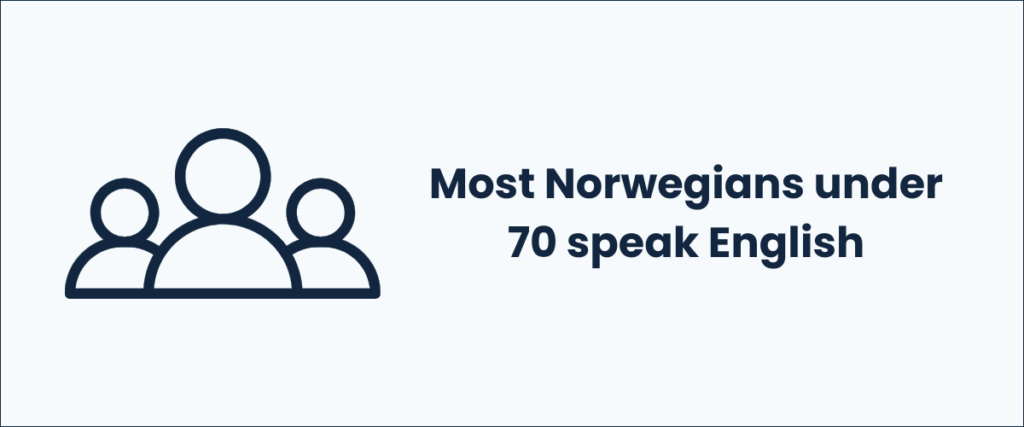
Since English first became mandatory in the 60s for pupils aged 13 and older, most adults under 70 should know some English. All adults under 30 should have received mandatory English education since primary school. As a result, the age bracket of 20-30-year-olds likely has the best language skills.
Indeed, the English Proficiency Index reflects this idea. Here’s a breakdown of the latest data:
- All test takers between the ages of 21 and 40 had proficiency scores of roughly 630-640 points out of 800.
- People ages 21-25 have the best English on average, with a score of 643 points.
- People aged 41+ had a score of 612, which falls in the “very high proficiency” category.
- The EPI scores of people aged 41+ have been rising consistently, from 542 points in 2016 to 604 points in 2020, and reaching a peak of 625 points in 2022.
- Adults aged 18-20 years old were the only age group to score below 600 points, dipping into the “high proficiency” category.
- English proficiency in people 18-20 years old has seen a downward trend, dropping from 668 points in 2016 to 617 points in 2020, and 596 points in 2023.
- Men had an English score of 637 in 2023, while women scored 592 points.
- Men’s and women’s scores have been roughly equal and stable through the years until 2023 when the test scores of women dropped by nearly 30 points compared to the previous year.
Overall, all age and gender groups in 2023 scored at least over 590, which is within the high proficiency bracket. The vast majority scored well over 600 points, having very high proficiency.
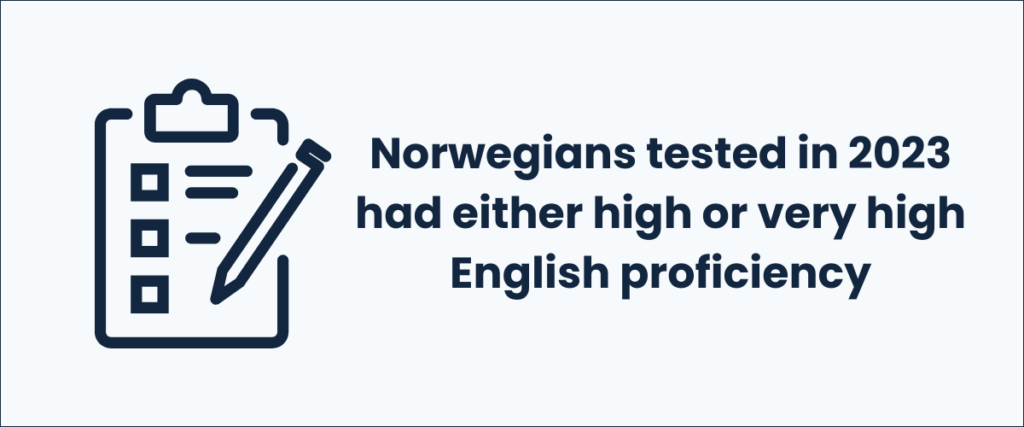
The rise in proficiency in people aged 41+ partly reflects a generational transition, with the previous older generations being gradually replaced by the first Norwegian students who took mandatory English classes in the 60s. However, the influence of cultural shifts and increased exposure to English media likely plays a role as well.
Sources: Education First
Conclusion
For years, Norway has consistently been among the top best English-speaking countries in the world. According to the data, most Norwegians speak English, and the average proficiency level is very high.
The best English speakers in the country are likely to be under 30 and living in highly urbanized areas, especially big cities like Oslo or Bergen. However, other demographic groups don’t fall far behind.
Although English is most common among the younger and more urbanized population, the average Norwegian under 70 years old likely has a good grasp of the language, regardless of the region where they live. Nowadays, English is a daily part of life in Norway, whether it’s in the workplace, academia, or leisure time.
FAQs
What are the languages spoken in Norway?
Norway has two official languages. Norwegian, the main official language, has two forms. Bokmål is by far the most common, with 90% of Norwegians using it as the main language for writing. Nynorsk, the second form, is used by 10-15% of the population.
Sámi, an indigenous minority language, is the second official language in Norway. Besides its official languages, Norway also has multiple recognized minority languages, the most important of which is Kven, a language closely related to Finnish. English, although not an official language, is the second most widely spoken in the country besides Norwegian.
Is English common in Norway?
Yes, English is widely used in Norway. Most of the menus, travel itineraries, and even some signs are bilingual in the large tourist locations. Navigating the country as a tourist shouldn’t be a problem, even if you don’t know Norwegian
All hospitality staff in the country must know English as a job requirement, and most locals are also likely to speak the language. Movies on TV and in cinemas are also in English, with translation being given in Norwegian subtitles.
Do Norwegians like speaking English?
Most people speak English in Norway, though attitudes towards the language vary. Young Norwegians are eager to practice their English language skills with English-speaking tourists, but older adults might be reticent.
Although English is common in academia and the workplace, concerns about national linguistic identity have surfaced in Norwegian media in recent years. According to a recent survey from The Language Council of Norway, 80% of respondents said they prefer speaking Norwegian when interacting with staff in their own country.
Tourists visiting the country aren’t expected to speak Norwegian. But those relocating or planning a long-term stay in the country will certainly find it helpful to learn the Norwegian language, especially for social and cultural experiences.